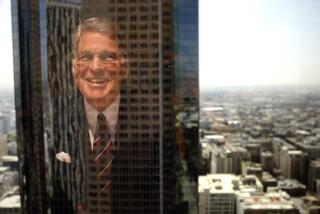FULLERTON : Aide Takes a Nuts, Bolts View of Job
- Share via
Throughout the 1980s, economic development leaders across the country called Gary Chalupsky, trying to lure one of his company’s Doubletree Hotels to their cities.
Many of them offered free land, free parking lots, even free buildings. But Chalupsky, then the hotel chain’s vice president of planning and development, often discovered that even with those incentives, the market for a luxury hotel in a town such as Bakersfield or Fresno just wasn’t there.
“These were $40-a-night hotel towns,” he said. “They didn’t believe it (when I told them). Nor was there a willingness to look at the numbers.”
Now the tables are turned. Chalupsky, 51, is Fullerton’s new director of economic development and redevelopment. But don’t expect him to be pushing for grand new convention centers or huge hotel complexes. Rather, he describes his work in Fullerton as “meat and potatoes,” working on projects they already have.
“I really don’t look to do any ‘Chalupsky memorial projects,’ ” he said. “ . . . The danger is thinking I can make a product and therefore there will be demand. It’s kind of a conservative approach to redevelopment. It’s not ‘build it and they will come.’ ”
Chalupsky joined the city three weeks ago, assuming half of the duties of Hugh L. Berry, Fullerton’s assistant city manager. Berry, who oversaw public works projects in addition to redevelopment, will retire in March after 31 years with the city.
Chalupsky will also take on newly created responsibilities of economic development--luring businesses to Fullerton, along with doing what the city can to keep the ones that are there.
A native of Minnesota, Chalupsky served in the Marine Corps from 1962 to 1965. He then returned to his home state and pursued a master’s in public administration at Mankato State University. He took a job there in city government and was quickly promoted.
In 1972, Chalupsky moved on to Monterey, where he helped revitalize the downtown and attract convention business to a new conference center. He stayed there for 10 years and then went on to Doubletree.
In contrast with his tenure at the chain, when it grew from 17 hotels to 60 during a prosperous decade, Chalupsky comes to the city during a recession and economic downturn. Several Fullerton auto dealerships--which are gems for city sales tax revenue--have been lured to Buena Park. With the threat of losing another one, the city recently gave $45,000 in rent payments to keep an automotive group’s Acura dealership in town.
And were it not for previous experience in city government during the 1960s and 1970s, Chalupsky would probably have been startled by austere public government ways. He works in a stark, pale-yellow basement office at City Hall. If he needs to travel he has to fill out a host of forms. He even has to punch in a department code to make photocopies.
But he’s not complaining. Chalupsky worked at Doubletree until last October, shortly after Toronto-based Canadian Pacific Hotels and Resorts bought the company and most of the high-level management departed.
“On the positive side, all of the politics are on the table,” he said. “(In the private sector) you have a strong executive context. . . . A person can have a dream and come in tomorrow and change direction immediately, whereas in city government you have 18 commissions. It’s much more inclusion (oriented).”
He added that he chose Fullerton over other cities and even staying in the private sector because of its cohesive staff organization and “a stable, community-minded council.”
More to Read
Inside the business of entertainment
The Wide Shot brings you news, analysis and insights on everything from streaming wars to production — and what it all means for the future.
You may occasionally receive promotional content from the Los Angeles Times.










